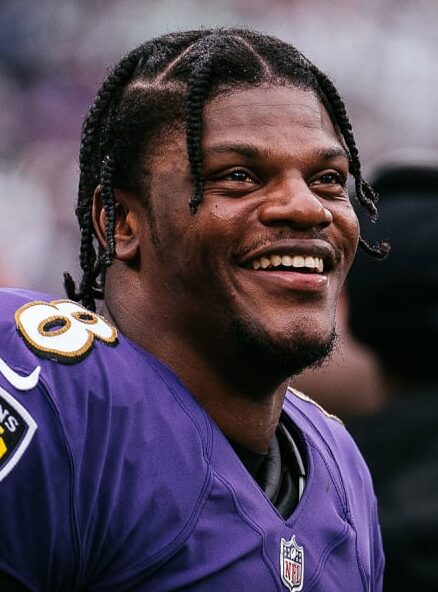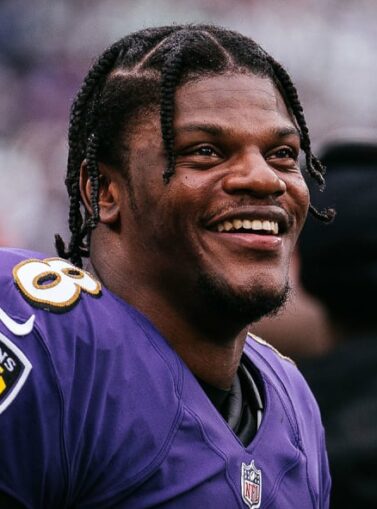

Lamar Jackson


Lamar Jackson
Quarterback Lamar Jackson’s row with the NFL franchise Baltimore Ravens has been making the rounds as of late. Recently, the Ravens’ public relations most likely leaked a story that the superstar quarterback turned down a $133 million contract.
As soon as this news got out to the public, the slander commenced. All the stock insults that are leveled at Black athletes applied to Lamar Jackson and his contract situation such as: Why is he begging for so much to play a game? He should be grateful for an organization like the Baltimore Ravens! The NFL needs to stop catering to thugs and prima donnas!
If you’re wondering if public opinion slandered Lamar Jackson as a thug, you would be right. But what transgressions did Jackson commit to warrant such a label? Has he committed any acts of domestic violence? No. Does he have a reputation of being surly towards his coaches? No record exists. Is there a pattern of him taking plays off and phoning it in? Considering they’ve experienced more success with him under center than otherwise, that would be nonsensical.
Given his productive career on the field and an unproblematic life off the field, the only reason why he would elicit such a negative reaction, from not only the front office but the media, is because he dared to be a Black athlete who knows his worth.
Black athletes have long had a history of being exploited in the U.S. When they were no longer relegated to playing in their own leagues for pennies and allowed to integrate, their talents and athletic prowess were taken advantage of by owners to enrich their coffers.
In the 1960s, teams like the Dallas Cowboys were worth a mere $600,000 dollars, roughly $6 million dollars in today’s money. (vault.si.com) Fast forward to 2023, when 60% of the players in the NFL are Black, the average NFL team is worth $3.5 billion, with teams like the Dallas Cowboys inching closer and closer to the $10 billion mark. (Forbes.com)
Owners like Jerry Jones and Jeffrey Lurie who paid tens of millions of dollars for the teams initially are now regularly featured in Forbes magazine on the strength of their gridiron investments. And it’s not just professional teams that are exploiting Black players. U.S. universities have had a long track record of taking advantage of the amateur status of NCAA players to generate revenue off Black athletes.
Growing up in poor neighborhoods with underfunded schools run by greedy bureaucrats, many Black boys view sports as one of the few ways they can escape these murky conditions. Ostensible full-ride scholarships are a ticket to a better life.
In exchange for the promises of a better life, the NCAA and its affiliated colleges expropriate hoards of money. The NCAA made over a billion dollars in 2021 off “March Madness” alone, and in 2016 the top 100 college football programs made around $5.5 billion in revenue. (yahoo.com)
The money colleges acquire from their programs allows them to build their academic prowess, as well as offer academic scholarships to other low-income students. The coaches, who are mostly white, also benefit heavily, with the average salary of coaches in the top 100 football programs inching close to $2 million per year. (sportico.com)
More scrutiny on Black players
In addition to having their labor heavily profited off of, Black players often encounter double standards in regards to how they conduct themselves on and off the field (or court). You hear how the media treats Black athletes who are outspoken and “passionate.” There are stories of Tom Brady yelling at his teammates for minor mistakes on his field. Media pundits explain away his outbursts as “passionate” and “an indication of his dedication to the game.”
Contrast that to the time wide receiver Terrell Owens gave an impassioned defense of his teammate, quarterback Tony Romo. When he wept while speaking to Romo’s character and ability, he was labeled an emotional and volatile diva.
When Colin Kaepernick took a knee to bring awareness to Black victims of police brutality, his once promising career was all but destroyed, while Tom Brady and his red MAGA hat enjoyed radio silence for their allegiances to Donald Trump. The double standard which Black players deal with has affected them to the point that they feel as if they have no choice but to just “shut up and play.”
Robert Griffin III, a former NFL quarterback and Heisman trophy winner, felt pressure not just from his coaches but from the media to be an upstanding player and character. He tried to smooth over any discrimination he faced as a Black quarterback, by saying that he didn’t want to be known as a Black quarterback, but that he wanted to be known as a quarterback. During his rookie season, his regal stoicism cost him a fruitful career, as he suffered a series of knee injuries that culminated in a torn ACL.
Given the potential life-threatening injuries NFL players are exposed to on a regular basis (Damar Hamlin’s heart failure being a particularly terrifying example), having a semblance of security to fall back on beyond their playing years becomes even more important.
Lamar Jackson hasn’t been the first quarterback to highlight his worth to the team. Retired New Orleans Saints quarterback Drew Brees nearly sat out of training camp, after refusing to play without a larger guaranteed contract than the Saints initially offered him, and he didn’t get half the backlash that Lamar Jackson is getting for doing so.
Even though Lamar Jackson is potentially harming his reputation by asking for a larger contract, his battle with the Ravens’ front office has the potential to set a precedent for Black athletes knowing their value and worth and advocating for their own self-respect.
The epic struggle of the Palestinian people against the full weight of U.S. imperialism and…
The following report comes from the Bronx Anti-War Coalition organizers on a protest held in…
In the Canadian federal elections held on April 28, the Liberals won with 169 seats…
The following is Part 2 of a talk given by the author to a meeting…
Boston Students, professors and workers are confronting the Trump administration’s fascist crackdown at universities across…
Philadelphia Within days of Swarthmore students reviving a pro-Palestinian encampment on April 30, police arrested…